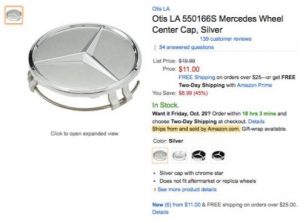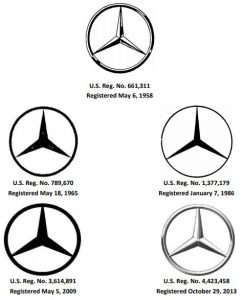 On October 20th, German carmaker Daimler AG (ETR:DAI) filed a lawsuit in the Central District of California alleging claims of federal trademark infringement committed by Seattle, WA-based e-commerce giant Amazon.com, Inc. (NASDAQ:AMZN) The suit alleges that Amazon has been complicit in the sale of counterfeit Mercedes-Benz parts and cites Amazon’s very successful business model of efficient infringement.
On October 20th, German carmaker Daimler AG (ETR:DAI) filed a lawsuit in the Central District of California alleging claims of federal trademark infringement committed by Seattle, WA-based e-commerce giant Amazon.com, Inc. (NASDAQ:AMZN) The suit alleges that Amazon has been complicit in the sale of counterfeit Mercedes-Benz parts and cites Amazon’s very successful business model of efficient infringement.
 At issue in the trademark infringement suit is Amazon’s sale of counterfeit wheel center caps bearing distinctive Mercedes-Benz trademarks. As an Amazon.com screenshot notes, the infringing products “Ships from and [are] Sold by Amazon.com.” Daimler allegedly bought the infringing wheel center cap products in August and October of 2016 and inspected the products to determine that they were neither authorized for sale nor manufactured by Daimler. Daimler alleges that the infringing products are rather manufactured by an Otis Inc. LA, which is headquartered in Marina del Rey, CA. Daimler’s suit highlights multiple ways that clearly reveal the infringing products are not genuine, including the chrome backside of the infringing products; Daimler engineers discovered that finishing the backside in chrome created an uneven finish and thus the genuine product doesn’t include this backside finish.
At issue in the trademark infringement suit is Amazon’s sale of counterfeit wheel center caps bearing distinctive Mercedes-Benz trademarks. As an Amazon.com screenshot notes, the infringing products “Ships from and [are] Sold by Amazon.com.” Daimler allegedly bought the infringing wheel center cap products in August and October of 2016 and inspected the products to determine that they were neither authorized for sale nor manufactured by Daimler. Daimler alleges that the infringing products are rather manufactured by an Otis Inc. LA, which is headquartered in Marina del Rey, CA. Daimler’s suit highlights multiple ways that clearly reveal the infringing products are not genuine, including the chrome backside of the infringing products; Daimler engineers discovered that finishing the backside in chrome created an uneven finish and thus the genuine product doesn’t include this backside finish.
 Daimler is asserting a series of U.S. registered trademarks which cover the well-known Mercedes-Benz logo used in the wheel center caps, an encircled three-pointed star, and which have been in force in some cases for half a century; the earliest trademark asserted by Daimler in the case was registered in 1958. The federal registration of the five asserted trademarks with the U.S. Patent and Trademark Office give Daimler the exclusive right to use the marks in commerce in connection with automobiles, motor trucks and automotive parts. Daimler notes that it has used the marks conspicuously for more than 50 years and it has spent billions of dollars in advertising, the result of which has made the Mercedes-Benz marks highly recognizable to U.S. consumers.
Daimler is asserting a series of U.S. registered trademarks which cover the well-known Mercedes-Benz logo used in the wheel center caps, an encircled three-pointed star, and which have been in force in some cases for half a century; the earliest trademark asserted by Daimler in the case was registered in 1958. The federal registration of the five asserted trademarks with the U.S. Patent and Trademark Office give Daimler the exclusive right to use the marks in commerce in connection with automobiles, motor trucks and automotive parts. Daimler notes that it has used the marks conspicuously for more than 50 years and it has spent billions of dollars in advertising, the result of which has made the Mercedes-Benz marks highly recognizable to U.S. consumers.
“Amazon is the world’s largest internet-based retailer by total sales and market capitalization, with revenues of $136 billion in 2016, a 27% jump from its 2015 revenues,” Daimler’s complaint reads. The German automaker added that Amazon’s e-commerce platform offers more than 350 million products to consumers, more than 12 million of which are sold directly by Amazon. However, Daimler argues that Amazon “facilitates the sale of an exorbitant number of counterfeit and infringing goods” through its platform, counterfeit activity which has increased since 2015 when the company began inducing Chinese manufacturers to list on its U.S. and European e-commerce platforms. Daimler notes that lawsuits over counterfeit products have been filed against Amazon by well-known consumer brands including a February 2017 suit filed by French luxury goods brand Chanel against the American e-commerce giant.
Not only are counterfeit goods regularly sold on Amazon.com but Daimler alleges that Amazon hasn’t shown a good commitment to ridding counterfeit goods from its platform. Daimler cites a news report on the consumer advocacy group The Counterfeit Report which has sent 32,626 notices to Amazon regarding counterfeit items listed on the e-commerce platform; many of the infringing items reportedly remained on the site even after counterfeit notices have been sent. Daimler alleges that, along with third-party sellers, Amazon itself is guilty of infringement of selling items which consumers think are authentic articles.
These activities are made more egregious given Amazon’s reputation among its customers. The Boston, MA-based management consulting firm Reputation Institute released an index in early 2016 which shows that Amazon is considered to be the most reputable company among U.S. consumers. The index tracks metrics including performance, governance, innovation and citizenship. Yet brand owners like Chanel and others do not hold Amazon in the same regard. Indeed, the German shoe manufacturer Birkenstock made the decision last July to have its products removed from Amazon’s website in response to a wave of counterfeit sandals being sold on the platform. Johnson & Johnson is another consumer goods brand which has removed popular branded items from the Amazon e-commerce platform because of brand quality issues stemming from third-party sellers.
According to Daimler, this counterfeiting activity on Amazon’s marketplace happens in direct conflict with Amazon’s own anti-counterfeiting policy. This policy states, in part:
“Customers trust that they can always buy with confidence on Amazon.com. Products offered for sale on Amazon.com must be authentic. The sale of counterfeit products, including any products that have been illegally replicated, reproduced, or manufactured, is strictly prohibited.”
However, the process by which rights holders must prove that Amazon has listed a counterfeit item for sale is time-consuming and prohibitive, according to Daimler’s allegations. Rights holders can submit a Report Infringement form which Amazon will consider on a case-by-case basis. To make the argument that an article listed for sale is a counterfeit, the rights holder usually must buy one or more of the articles to confirm their inauthenticity. Thus, Amazon only employs a post-hoc system for removing counterfeits from their website and does not actively prevent infringement of copyrighted or trademarked items. Further, Amazon’s counterfeit policy shifts the onus of proving infringement onto the rights holder and not the third-party which is often clearly guilty of selling counterfeit goods.
The sale of the counterfeit Mercedes-Benz wheel center caps are not simply an issue of intellectual property rights; there are also major issues caused by product quality and consumer satisfaction. As Daimler notes, a number of negative reviews left for the counterfeit Otis LA wheel center caps demonstrates how the sale of the counterfeit items tarnish Daimler’s brand reputation because of poor quality. Reviews cited by Daimler come from buyers of the Otis LA caps who were “unhappy [with] how cheaply they’re constructed.” One customer noted that the caps tinted yellow within two weeks. Another commented on the spring retention tabs in the wheel center caps and how easily they snap off even when the cap is properly centered in the bore.
Daimler alleges that it has notified Amazon on multiple occasions of the sale of the counterfeit goods but that Amazon has done little to remedy the situation. Despite Amazon’s claims that it is not responsible for the infringing activity of third-party sellers, the e-commerce giant makes a guarantee that it ships and sells the infringing items right on the product page and has done nothing to create a system that detects and deters infringement. “As of the date of this Complaint, Amazon has not instituted any sufficient solutions to Daimler’s infringement concerns, and has refused any commitment to install such solutions,” Daimler argues. Daimler’s suit includes six counts as causes for action including federal trademark infringement, trademark dilution, unfair competition and violation of the California Consumer Protection Act.

![[IPWatchdog Logo]](https://ipwatchdog.com/wp-content/themes/IPWatchdog%20-%202023/assets/images/temp/logo-small@2x.png)

![[Advertisement]](https://ipwatchdog.com/wp-content/uploads/2024/05/Quartz-IP-May-9-2024-sidebar-700x500-1.jpg)
![[Advertisement]](https://ipwatchdog.com/wp-content/uploads/2024/04/Patent-Litigation-Masters-2024-sidebar-last-chance-700x500-1.jpg)

![[Advertisement]](https://ipwatchdog.com/wp-content/uploads/2021/12/WEBINAR-336-x-280-px.png)
![[Advertisement]](https://ipwatchdog.com/wp-content/uploads/2021/12/2021-Patent-Practice-on-Demand-recorded-Feb-2021-336-x-280.jpg)
![[Advertisement]](https://ipwatchdog.com/wp-content/uploads/2021/12/Ad-4-The-Invent-Patent-System™.png)






Join the Discussion
One comment so far.
curoius
November 16, 2017 10:44 amIn my limited, anecdotal experience, no, Amazon does not do enough to police counterfeits. I’ve received lots of things that were clearly not as advertised. Of course, at least one time was my fault, the seller was “toys-rus” not “toys-r-us”. There are lots of those out there.
One time I ordered from a legitimate company, and received a knock-off. I called the company, they said to return it to Amazon and they would ship the real thing to me from their own warehouse. The lady on the phone explained to me that they (the legitimate company) had even had Amazon send them fakes during their regular quality assurance tests. They (the legitimate company) were NOT AT ALL happy that Amazon would send out fakes to fulfill orders for the legitimate company when the legitimate company knew for a fact that Amazon’s warehouses were well stocked with the real product.